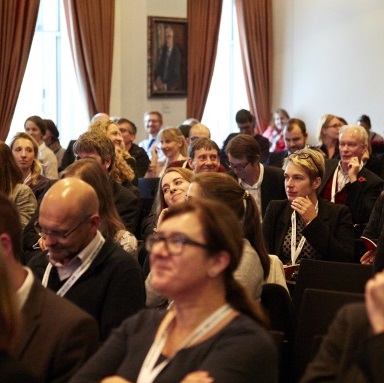The Research culture: Changing expectations conference at the Royal Society explored research assessment, development, dissemination, integrity and career progression.

For two days at the end of October the Research culture: Changing expectations conference at the Royal Society explored research assessment, development, dissemination, integrity and career progression. It was a chance to explore the challenges of research culture and showcase initiatives that will improve the cultural conditions and environments in which research and researchers can flourish. Publishing is a key element of this culture and our Publisher, Phil Hurst was in attendance.
This conference was a unique chance to step back from day to day research and publishing cycle and think about the wider benefits that healthy research culture can bring not only to researchers, but to society as a whole. A healthy research culture has the potential to help us tackle global challenges such as climate change, biodiversity and feeding the world. As Chairman of UKRI, Sir John Kingman indicated, producing researchers relies on a pipeline that starts with encouraging students to choose science at school. Attracting and retaining people in research requires a positive culture.
What are the challenges facing our research culture?
My own interest is, as you would expect from a publisher, the role of research communication in the academic ecosystem. At a simplistic level, the reward structure (and hence the culture) is currently driven by the publication of high impact research in elite journals.
Let’s unpick this a little
Reward structure
In science research assessment, the most important research output is the published journal article. The quality and impact of an article is used to allocate research funding and determine career advancement. This model makes the research environment highly competitive.
High impact research
Scientific research is based on advancing understanding by undertaking high quality work and disseminating validated findings. Research which shows something new is highly valued. With the high volume of published outputs, there is a risk of assessment focussing purely on the novelty and impact of findings and less on experimental and analytical rigour.
Elite journals
These certainly have an important role in selecting and publishing interesting and important research. However, the concern is how they are used in research assessment. Conference delegates had lively discussions and concluded that an assessment of quality should come from what you publish rather than where you publish.
Unfortunately, researchers (especially early in their careers) need to ‘play the game’. They have to publish in elite journals in order to achieve funding and tenure. This creates a perverse incentive to ‘cherry pick’ from experimental data and find statistical significance where there isn’t any. Measuring the impact of researchers by incorrectly applying the impact factor of the journal they have published in is another problem and has been widely opposed through organisations such as DORA.
What can be done to improve research culture?
The conference concluded with a poll of delegates. It was clear that creating a positive research culture will need both a top-down approach from research leaders and a grass-roots approach from everyone in the research enterprise. From a publishing perspective, I feel there needs to be a shift in thinking about assessment of research outputs. There will always be a hierarchy of publishing venues. However, assessment must focus more on what work is published rather than on where it is published. A scientific journal must provide a rigorous assessment of all aspects of a research study including methodology, analysis and findings through critical peer review. This is what we try to do at the Royal Society. Increased transparency offered by open science will also help. Practices such as preregistration of studies, open methods, mandated data sharing, publication of peer review information and open access can all contribute to evaluating research on its merits, not solely on where the research article is published. The drive to produce more and more research articles needs to be arrested – let’s focus on quality rather than quantity! Dissemination of research findings will remain a core aspect of science. However, we need to place more emphasis on recognising other outputs too, such as work on peer review, sharing data, teaching and outreach to the public.
We all need to work hard to achieve a positive research culture, the conference was a fascinating glimpse into the many perspectives and initiatives that enable more excellent research.
This conference was live streamed, catch up on Monday 29 October and Tuesday 30 October.
